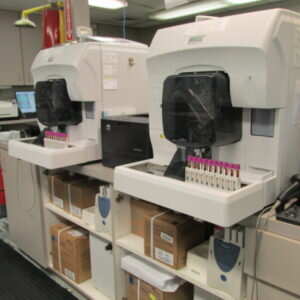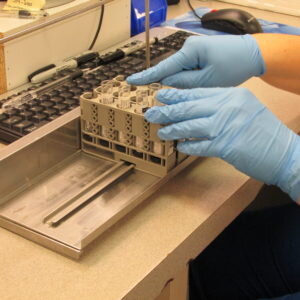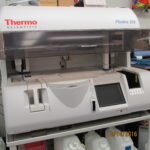





Our State of the Art Clinical Lab
Our Laboratory
The Elkhart Clinic Laboratory is a very busy place. Each year the laboratory produces over 800,000 laboratory test results to help our physicians care for our patients. The laboratory processes blood, urine, tissue, and other body fluids for testing. Laboratory testing can include things like blood cell counts and identification, general chemistry testing, immunoassay testing, Coagulation testing, and urinalysis testing.
Phlebotomy
Ever wonder who those people are that draw your blood? The word phlebotomy is Greek meaning “to make an incision in a vein with a needle”. The person who performs this procedure is called a “Phlebotomist”. Our phlebotomists have all been trained to collect blood and as a group have over 100 years of experience doing this.
Think you might be interested in training to be a phlebotomist? Several local colleges offer training programs including Ivy Tech.
Hematology
The hematology department is where a blood specimen is examined at the cellular level. Automated instruments separate the different types of blood cells (red blood cells, platelets, and white blood cells) counts them, and looks at the cells to determine if they have any abnormalities. The laboratory technician reviews these reports and can perform a manual blood count if necessary using microscopic examination.
Immunoassay
Our newest addition to the clinical laboratory is a immunoassay test system. The Phadia Immunocap 250 system can test for more than 80 different allergens. The instrument also performs autoimmune testing for conditions like Lupus and Rheumatoid Arthritis. This testing helps support our Allergist and Rheumatologist in providing the best patient care.
Chemistry
The Chemistry department uses an integrated testing platform to perform general chemistry and immunoassay testing. This one instrument allows the laboratory to minimize the number of blood tubes collected because all tests can be done from just one specimen. General chemistry testing performed include lipid panels and basic metabolic panels. These panels give the physician an overall assessment of your general health looking for disease states like diabetes and high cholesterol. Immunoassay testing includes tests for thyroid function and even tumor markers like PSA and CEA. These specific immunoassay tests help your physician monitor how well your medication is working or the effectiveness of treatments.
Urinalysis
The urinalysis department uses chemistry and flow cytometry technology to analyze chemical compounds and cellular materials in a urine sample. The newest instrument added to our laboratory helps integrate what was a manual process for urine testing into a fast streamlined work cell. Our new system uses a smaller sample volume and has extremely low sensitivity levels helping us provide the best possible care to our patients.
